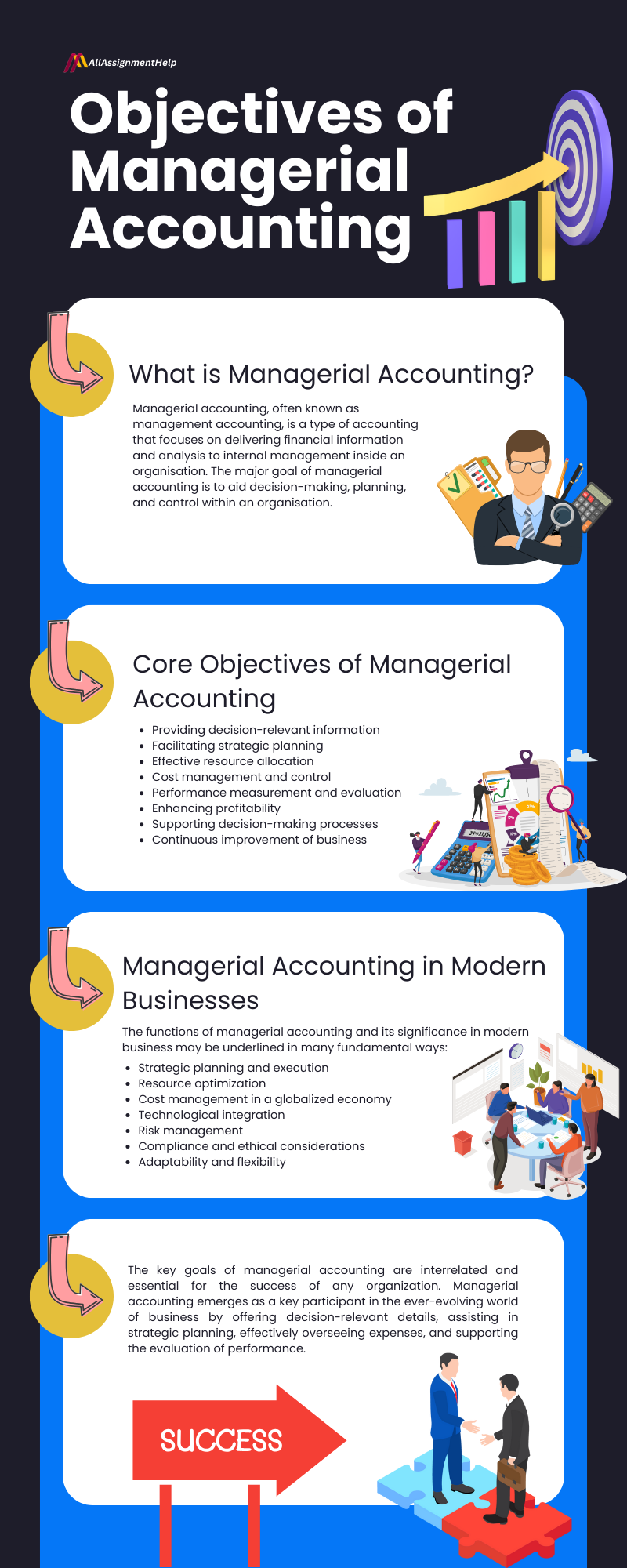Table of Contents
Managerial accounting acts as a compass, leading organizations through the complex decision-making and financial management arena. While financial accounting serves external stakeholders, managerial accounting is a trustworthy partner within an organization, offering crucial resources for strategic planning and control. In this blog by All Assignment Help, we will address the main goals of managerial accounting and why it’s so important to current corporate performance.
What is Managerial Accounting?
Managerial Accounting is the process through which information is provided to the management of the organization for better decision-making. Thus, various costs, expenses, and revenues are measured, analyzed and interpreted. This will help managers to make informed decisions about the activities of the organization. The most important difference between managerial accounting and financial accounting is that the latter is used for reporting to the outside stakeholders of the company while the former assists in decision-making within the company.
Managerial accounting uses various forms of accounting. These forms can help the decision-makers make relevant decisions based on the capability and goals of the organization. It helps to provide the metrics related to the operations and conduct of the business. Information related to the costs and expenditures helps to decide on the products and services offered by the company at prices which meet the needs of the target customers. The data from such metrics are used to plan and prepare the budget. Any deviations from the planned performance metrics indicate a sign of changes to be made for the achievement of the goals.
Also, when it comes to academics, accounting can be tough for students. So, do you also find it tough to navigate the complexities of your accounting assignments? If yes, then how about getting world-class assistance from online assignment help services operating online? These services are there to assist in overcoming academic challenges for a smoother learning experience. So, if you are facing any academic trouble, let the experts know today!
Also read: How to Complete Management Accounting Assignment Easily?
Core Objectives of Managerial Accounting
The key objectives of managerial accounting are varied, representing its crucial function in assisting organizations in overcoming the intricacies of company management. Moreover, for anyone seeking to enhance their understanding of this area of study, whether for academic or professional development reasons, online courses are a good choice as they provide accessibility and adaptability for students looking to understand the complexities of the subject.
However, if you ever find that these classes are adding up to your packed academic schedule, you can seek expert assistance through online platforms under the keyword, take my online class for me. You can use these services to take your accounting class or delegate your other academic obligations to the experts. In this way, you can stress-freely dive into the key objectives of managerial accounting and obtain practical knowledge for real-world decision-making scenarios. Now here are some of the primary objectives of managerial accounting.
Providing decision-relevant information
Managerial accounting’s primary goal is to give internal managers current, precise, and relevant information. This data is critical for making informed decisions regarding day-to-day operations, long-term strategy, and overall business performance.
Facilitating strategic planning
Managerial accounting is necessary for strategic thinking because it provides information about previous performance and forecasts future trends. This purpose comprises assisting managers in identifying achievable goals, developing techniques for achieving them, and reacting to changes in the company environment.
Effective resource allocation
One of the most important managerial accounting goals is to provide the best management of resources, including human, financial, and operational assets. Managerial accounting contributes to determining areas of inefficiency, evaluating the economic viability of various company sectors, and guiding choices concerning how to invest resources for optimum impact.
Cost management and control
It can help manage and control expenditures within an organization. This involves looking at the expenses involved with production, shipping, and other operational operations. Managerial accountants help businesses improve overall cost-effectiveness by determining cost drivers and implementing economical alternatives. Also, if you are a student studying accounting, the complex assignment might intimidate you. Therefore, if you ever come across such circumstances, seek expert assistance from the best online assignment service. With expert assistance, you can compose assignments of the best quality.
Performance measurement and evaluation
Monitoring the accomplishments of many areas of the organization is an important managerial accounting purpose. Moreover, it generates performance measures, compares real outcomes to planned goals, and gives details about the efficacy of different business procedures and units.
Enhancing profitability
Managerial accounting strives to improve whole profitability by recognizing revenue opportunities, optimizing pricing methods, and effectively controlling costs. This mission is consistent with the organization’s overall goal of maintaining its financial health and sustainability.
Supporting decision-making processes
Managerial accountants encourage decision-makers by giving them both qualitative and quantitative information to assist them make sound choices. Whether it’s incorporating something new, joining a new market, or retiring an underperforming product line, managerial accounting supplies the knowledge needed to make decisions.
Continuous improvement
It means applying management accounting data to discover possibilities for enhancement and productivity advantages. Businesses may improve their strategies and procedures over time by tracking performance measures and analyzing deviations.
Hence, the primary objectives of managerial accounting are intertwined and focused on providing managers with the knowledge they require to cope with the constantly changing business environment, make informed decisions, and guide the organization forward.
Also read: Overcome Accounting Challenges with Accounting Assignment Help Online

Importance of Managerial Accounting in Modern Businesses
Managerial accounting is more relevant and important than ever in today’s changing business situation. Moreover, it is an effective tool that helps businesses face present-day business obstacles and fast change. The functions of managerial accounting and its significance may be underlined in many fundamental ways:
Strategic planning and execution
The strategic planning process is a necessity for every firm that wishes to remain competitive. Here, the role of managerial accounting is to enable businesses to create and execute strategic strategies by providing insights into past achievements, market trends, and most likely future situations. This insight is critical for predicting obstacles and capitalizing on opportunities.
Resource optimization
In the modern business setting, when resources tend to be few and needs are always changing, optimum resource allocation is important. Managerial accounting supports organizations in identifying opportunities for productivity advancement, allowing them to more efficiently install human, financial, and operational resources. Also, if you come across accounting complexities during your academic years, do not hesitate to consult assignment experts for an outstanding academic paper.
Cost management in a globalized economy
Knowing and managing expenses become more complicated as firms operate on a global scale. Managerial accounting strategies enable organizations to analyze and regulate expenses, hence guaranteeing worldwide competitiveness.
Technological integration
The integration of new technologies such as machine learning and statistical analytics is altering corporate settings. Hence, answering to advancements in technology by offering instruments to facilitate decision-making based on data and increasing the efficiency of financial analysis is a crucial role of managerial accounting here.
Risk management
The unpredictable nature of international markets creates a variety of threats. Managerial accounting facilitates organizations in recognizing, analyzing, and managing risks, thus improving the capacity to manage uncertainty and maintain financial stability.
Compliance and ethical considerations
In an era of increased scrutiny from regulators and a greater emphasis on ethical corporate operations, management accounting is crucial. It assists organizations in complying with financial reporting guidelines, hence increasing openness and accountability.
Adaptability and flexibility
In today’s business, adaptability is important. Managerial accounting enables organizations the capacity to adapt their strategy, operations, and allocation of resources in response to shifting trends in the market, technological advances, or regulations.
Hence, we can say that managerial accounting is at the leading edge of contemporary business administration, providing invaluable tools for managers dealing with the complicated dynamics of the modern marketplace. Its agility, emphasis on planning for the future, and support for resource optimization make it an essential element in attaining long-term profitability and competitiveness in an ever-changing company landscape.
In addition to this, if you are learning managerial accounting through online platforms, there are chances of facing issues that might become a hurdle in your learning. For example, poor internet connectivity, low technical skills, or an excessively packed schedule. As a result, it is common for students like you to have stressful thoughts like, Can I find someone to do my online accounting class for me? If you are also wondering the same, then the answer is online experts. Yes! There are platforms online that can provide you with subject matter experts to help you overcome such stressful moments.
Conclusion
Finally, the key goals of managerial accounting are interrelated and essential for the success of any organization. It emerges as a key participant in the ever-evolving world of business by offering decision-relevant details, assisting in strategic planning, effectively overseeing expenses, and supporting the evaluation of performance. As organizations navigate the intricacies of today’s marketplaces, implementing accounting objectives becomes more than an option, but a strategic need for long-term success.
Frequently Asked Questions
| Question: How does managerial accounting encourage experimentation and innovation? Answer: Managerial accounting helps managers to innovate and experiment with various cost methods which can improve the performance of the company. It provides the necessary data required to experiment with various models and choose the one which will be effective for the organization. |
| Question: What is the difference between gross margin and contribution margin? Answer: The main difference between gross margin and contribution margin is that the contribution margin does not include fixed costs. It plays a role in managerial accounting by determining real product margins for the business. |
| Question: What are some major objectives of managerial accounting? Answer: Some of the objectives of managerial accounting are development and planning, evaluation and controlling, decision-making, external and internal user reporting, etc. |
